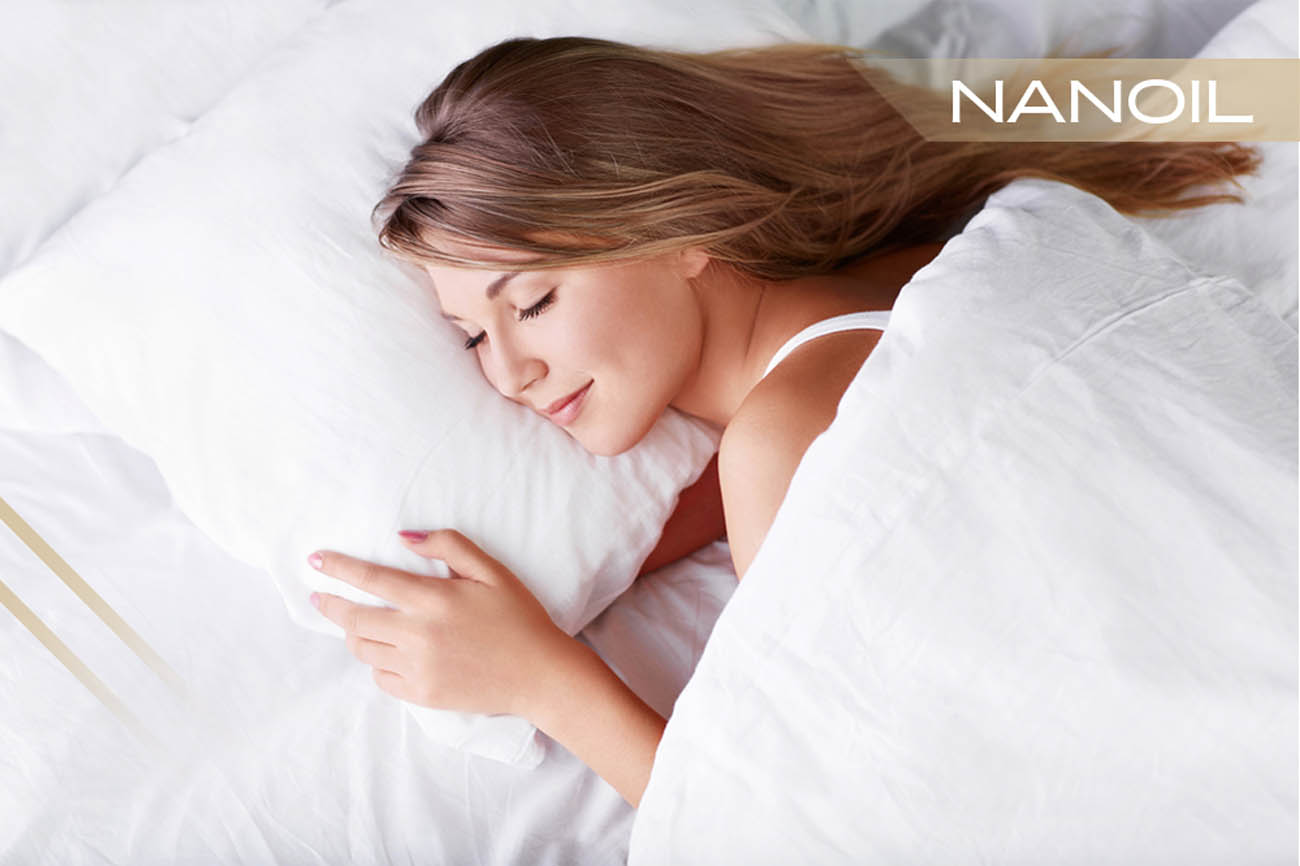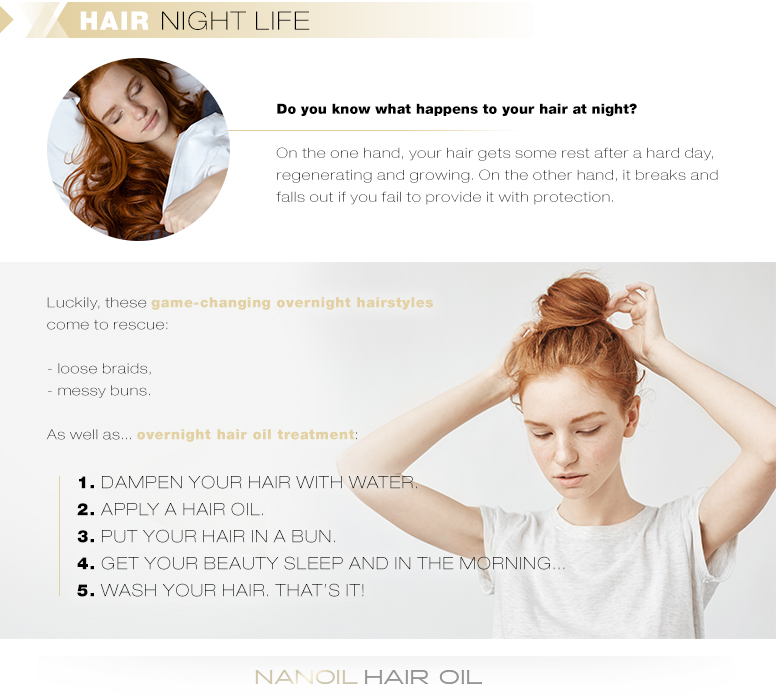- NANOIL Products
- Oils
- Face serums
- Hair masks
- Shampoos
- Hair conditioners
- Hair styling
- Care
- Hair Porosity Test
- Blog
- Contact

Night is the big time for your hair. It’s the time when your strands rest, regenerate and grow. You can either enhance or unconsciously disturb the processes. Do you know anything about the bedtime hair care routine to enjoy a fabulous and voluminous hairdo in the morning?
You can take care of your hair at night as well, by protecting from damage and ensuring nourishment. Check how to do it!
During sleep, many processes occur in our bodies. We’re often unaware of them. Lots of the processes take place in your scalp, making hair repair, growth and reinforcement possible. It’s little wonder that the night hair oil treatment gives the best results. Hair lives a very busy life at night. This is the time when the absorption of nutrients is the best and the most intensive.
It’s really easy to both damage and regenerate hair at night. Be careful because it’s not hard to ruin the strands while asleep. Do your best to protect them. You should know what happens to hair at night and how to take care of it the right way.
Each and every night, (not only thin, fragile) hair is exposed to physical damage, especially when hair’s long and prone to knotting or when you share a bed. Someone might accidentally tear, pull out or break a few of your strands. Still, we can do damage ourselves, tearing, pulling or unconsciously tangling the hair – especially when we’re quite lively during sleep.
The most common hair problems caused by failing to effectively protect hair while asleep include:
Few women realize the importance of evening hair care. We skip the bedtime hair care routine because we nourish and repair our strands during the day. However, it would be awful to waste all the efforts we make daily because of lack of hair protection at night. Day pampering and nighttime damage make no sense, that’s for sure.
You should know a few rules which protect you from various hazards lurking at night:

Should you tie your hair up for sleep? Women come in two groups – the fans and opponents of tying hair up before sleep. Both options have benefits and downsides that you should learn before deciding on the best sleep time hairdo.
Sleeping with hair down is much safer if you’ve got short hair. In the case of long hair, leaving it loose for the night ends up in knots and breakage, frizzy and static flyaways or even thinning. On the other hand, this solution has some pluses – the skin rests, regenerates and cleanses when your hair isn’t tightly tied up. Also, the air flow is enhanced and you simply feel comfier.
Sleeping with tied hair is suitable exclusively for women having lengthy hair. Hairstylists definitely advise on sleeping with tied back hair because you prevent knots and reduce the risk of damage this way. As a result, hair’s smoother, less frizzy and damage-free. There’s one drawback, though. When you get a tight updo, it means weaker bulbs and may trigger hair loss.
A suitable nighttime hairdo must be loose enough not to weaken your hair bulbs or cause the feeling of tightness. On the other hand, it must be tight enough to protect your hair from physical damage. Here are the most popular sleeping hairstyles which will definitely make you feel comfy and protect your hair:
Apart from knowing which hairdo to wear, it is important to choose proper accessories to avoid ruining the strands. Various types of metal and plastic scrunchies, pins and other hard accessories are out. Soft hair ties without metal elements and Invisibobble make the best choice. You can also try making use of a cotton scarf or a long strip cut out of the old T-shirt. Remember to keep things soft and delicate.
There’s another benefit of tying hair for the night except for damage protection. It’s a flawless way to style a hairdo and boost volume without the need for heat styling tools. If you don’t know how to get heatless waves, it’s time you learned about natural ways to curl your hair and add volume. All while you get your beauty asleep!
How to upgrade hair condition while being asleep? The easiest way involves providing proper nutrients which are essential for regeneration. Protection from damage matters but it’s not the most important. That is why you should apply hair oil treatments before going to bed.
Oiling is a home therapy which does not only protect your hair from loss of moisture and damage but also nourishes and makes it stronger. Omega fatty acids, vitamins, phytosterols and other enhancing substances included in natural oils penetrate your hair and its bulbs when you’re asleep. In the morning, a wash will do – strong, resilient, luminous, silky smooth and easy to handle hair comes into sight.
Why does a hair oil treatment give the best results when you let it sit in hair throughout the night? Oils have more time to be absorbed, they don’t weigh down your hair, they work more deeply and create a protective layer which also saves from the physical damage.
Comments: #0